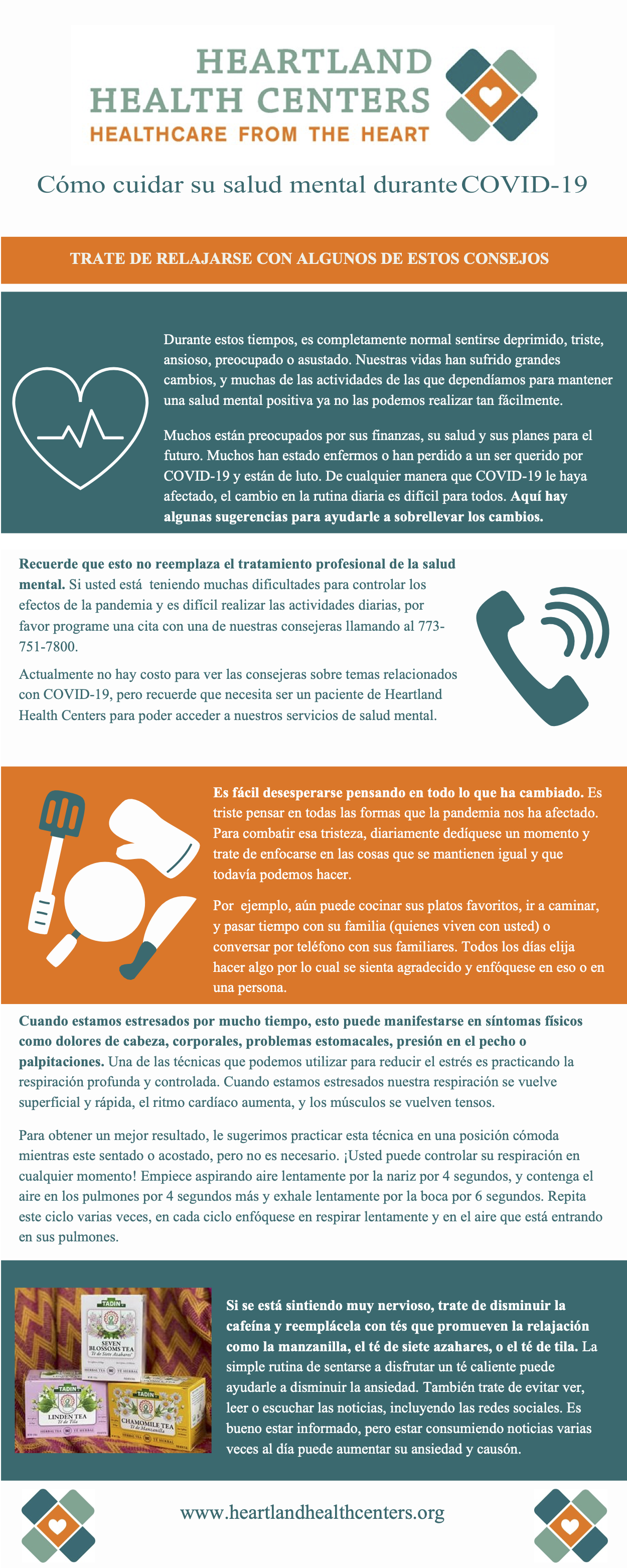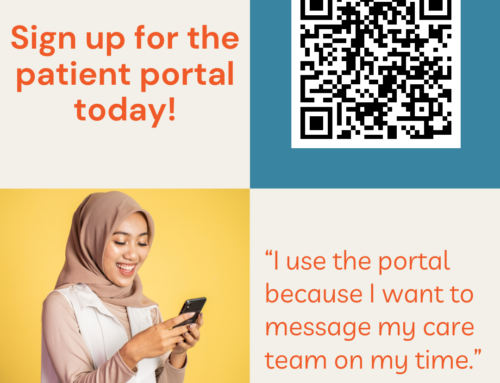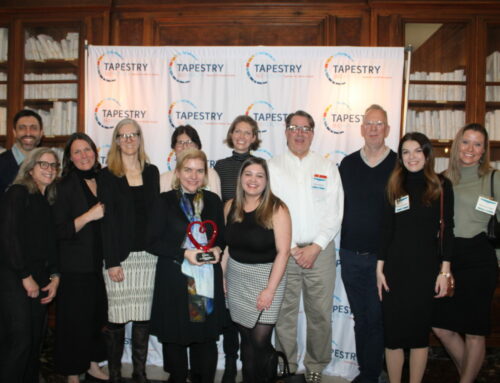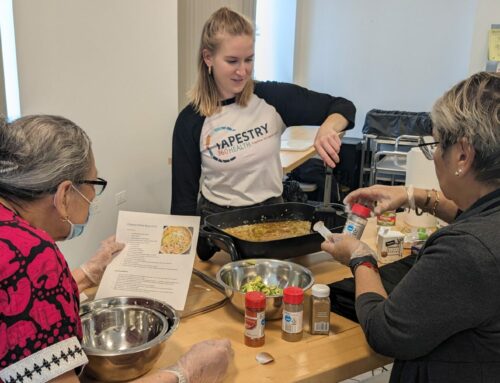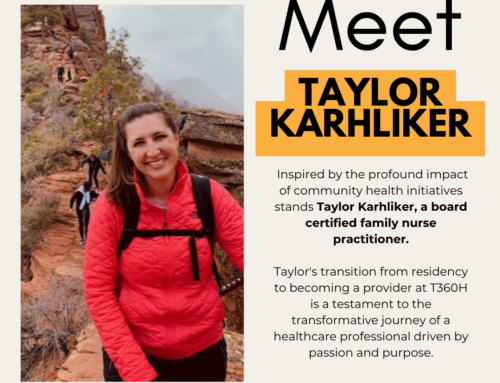News
Counselors busier than ever caring for patients’ behavioral health
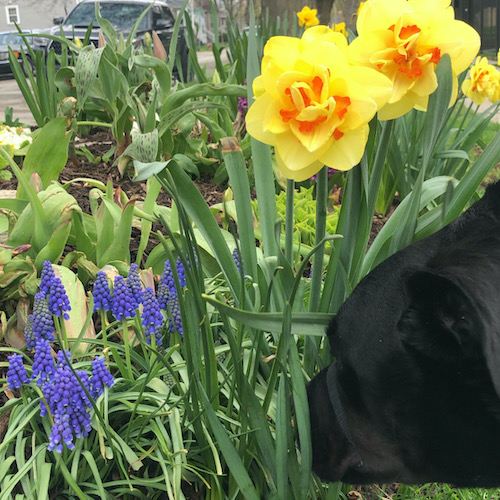
Finding three beautiful things while walking her dog each morning is a daily routine that helps Tapestry 360 Health counselor Margaret Espinoza stay grounded, one that she also recommends to patients.
Counselors on Tapestry 360 Health’ primary care teams are busier than they’ve ever been. Working from home and connecting by phone or video, they’re listening, providing support, but also frustrated by the limits of what they can do to help.
“People are struggling with the loss of routine,” says Maria Lopez-Boada, LCSW, based at Tapestry Albany Park. Margaret Espinoza, LCPC, based at Tapestry Lincoln Square, echoes that: “I’m on repeat some days with the basics,” she says. “Reminding people to schedule downtime, follow their routines … we do so much automatically and when that is stripped from people they become emotionally fatigued.”
The two women are among 11 staff and 3 contracted Behavioral Health Consultants–counselors integrated with primary care teams in Tapestry 360 Health’ community and school clinics. The Behavioral Health Consultant role reflects the clinic’s “whole-person” approach to health care, says Director of Behavioral Health Services Denise Fuentes, LCSW, CADC.
As part of a care team for each patient, Behavioral Health Consultants help develop a holistic treatment plan that may also include providing patients access to psychiatry, health & wellness classes, integrative medicine. They also refer patients to community resources, such as legal assistance, that impact well being.
“We work together to take into consideration patients’ mental health, environment, supports, culture and spiritually in addition to presenting medical issues,” Fuentes says. “We see this even more today, because COVID-19 is affecting all of us whether we are infected or not.”
Espinoza and Lopez-Boada connect with patients by phone and video from home throughout the workday. They listen and provide clinical support as well as practical tips, being a sounding board or a sympathetic ear.
They say many patients describe feeling irritable or even guilty. “We’re stressed every day by the things that we value,” Lopez-Boada says. “You may be glad you have your family with you, but annoyed they’re with you all day long.”
Espinoza shares the story of a patient who values her life as a homemaker. She’s dedicated to caring for her family but also used to go to Zumba or take a breather. Now, she’s having to learn new computer skills and dishes are piling up: “Now she’s the mom, the teacher and the lunch lady, too,” Espinoza says.
The counselors also deal with fear and loss, lending a shoulder for those who have lost family members or helping normalize patients’ discomfort going to work or shopping.
“I had a patient who’s going back to work at a meatpacking plant that was shut down,” Espinoza says. “She needs to go back, but at the same time she’s scared for her health….” Espinoza says. “I couldn’t confirm for her that she would be OK. I had to tell her, ‘you have to do what you’re comfortable doing.’”
She and Espinoza both share with patients the precautions they take themselves. They also help patients keep up with shifting instructions from the city, CDC and other sources. Spanish-speaking patients sometimes ask them to translate the details. It helps that the two counselors are from similar immigrant communities where their patients live.
“We can talk to people about their day to day routines,” Espinoza says. “For someone who’s nervous about crowds I can suggest, ‘Hey, on such and such corner during this part of the day there’s not a lot of people, you should check that out.’
Although the services they provide help people cope, both Espinoza and Lopez-Boada say they are frustrated, too. One of the hardest parts of their role, they said is hearing about patients’ economic or personal safety concerns.
“I want to say that I feel great about providing a service but a lot of times…I’m telling people things and what people need is action,” Espinoza says. “There’s a world of haves and have nots and that just makes me feel frustrated about their situation.”
Patients describe being harassed by landlords who want rent they can’t pay. Many immigrant patients did not qualify for stimulus checks, they note, which is another source of frustration that comes up in sessions.
Doing referrals is difficult, Lopez-Boada notes, in a time when services have been interrupted or limited. One patient had done everything she needed to get an order of protection in domestic violence court, but with hearings suspended has been unable to get the order. Another patient who has COVID-19 is limited in what care they can receive because they are on electronic monitoring from the Cook County Jail.
“Nothing like this pandemic has touched patients’ lives and people who were vulnerable to begin with are struggling a lot more than the average person,” Lopez-Boada says. “Everyone’s doing the best they can, but it’s hard.”
Tapestry 360 Health Counselors’ Tips For Your Mental Health
Lopez-Boada’s Tips
Try to have a routine. Going for a walk, yoga videos, time for yourself, meditation, deep breathing videos in Spanish – these are a few samples of routines that patients have found helpful. “Everybody’s different,” Lopez-Boada says. “Do something that works for you.”
Focus on what you can still do. Things you can still control, like making a favorite meal or going for a walk, can stop you from feeling overwhelmed by what is happening every day; focus on those, not what has changed.
Look for new things to do that are simple and feel OK. It can be hard to learn new skills in the middle of a situation but you can try new hobbies. One patient decided to try taking care of plants, another was picking up painting. Find things that are simple and acceptable and feel OK.
Espinoza’s Tips
Carry your identity wherever you go. Carry your identity into the pandemic time — continue or adapt habits to maintain emotional and physical health. There are innate things that you do to bring comfort to your mind/body. “My morning ritual is mine–a coffee, a walk, reading and journaling,” Espinoza says. “I know that if I start my day in a calm state I can tackle adversity from a calm place.”
Gratitude for the little things. We often will be reminded of what we no longer have or what plan was cancelled because of social distancing. But acknowledging what we do have at this time can bring perspective. The warmth of sun on your skin, the new flowers budding on your neighborhood walk or just that book you finally got around to reading.
Descargar consejos por relajarse
Finding three beautiful things while walking her dog each morning is a daily routine that helps Tapestry 360 Health counselor Margaret Espinoza stay grounded, one that she also recommends to patients.
Counselors on Tapestry 360 Health’ primary care teams are busier than they’ve ever been. Working from home and connecting by phone or video, they’re listening, providing support, but also frustrated by the limits of what they can do to help.
“People are struggling with the loss of routine,” says Maria Lopez-Boada, LCSW, based at Tapestry Albany Park. Margaret Espinoza, LCPC, based at Tapestry Lincoln Square, echoes that: “I’m on repeat some days with the basics,” she says. “Reminding people to schedule downtime, follow their routines … we do so much automatically and when that is stripped from people they become emotionally fatigued.”
The two women are among 11 staff and 3 contracted Behavioral Health Consultants–counselors integrated with primary care teams in Tapestry 360 Health’ community and school clinics. The Behavioral Health Consultant role reflects the clinic’s “whole-person” approach to health care, says Director of Behavioral Health Services Denise Fuentes, LCSW, CADC.
As part of a care team for each patient, Behavioral Health Consultants help develop a holistic treatment plan that may also include providing patients access to psychiatry, health & wellness classes, integrative medicine. They also refer patients to community resources, such as legal assistance, that impact well being.
“We work together to take into consideration patients’ mental health, environment, supports, culture and spiritually in addition to presenting medical issues,” Fuentes says. “We see this even more today, because COVID-19 is affecting all of us whether we are infected or not.”
Espinoza and Lopez-Boada connect with patients by phone and video from home throughout the workday. They listen and provide clinical support as well as practical tips, being a sounding board or a sympathetic ear.
They say many patients describe feeling irritable or even guilty. “We’re stressed every day by the things that we value,” Lopez-Boada says. “You may be glad you have your family with you, but annoyed they’re with you all day long.”
Espinoza shares the story of a patient who values her life as a homemaker. She’s dedicated to caring for her family but also used to go to Zumba or take a breather. Now, she’s having to learn new computer skills and dishes are piling up: “Now she’s the mom, the teacher and the lunch lady, too,” Espinoza says.
The counselors also deal with fear and loss, lending a shoulder for those who have lost family members or helping normalize patients’ discomfort going to work or shopping.
“I had a patient who’s going back to work at a meatpacking plant that was shut down,” Espinoza says. “She needs to go back, but at the same time she’s scared for her health….” Espinoza says. “I couldn’t confirm for her that she would be OK. I had to tell her, ‘you have to do what you’re comfortable doing.’”
She and Espinoza both share with patients the precautions they take themselves. They also help patients keep up with shifting instructions from the city, CDC and other sources. Spanish-speaking patients sometimes ask them to translate the details. It helps that the two counselors are from similar immigrant communities where their patients live.
“We can talk to people about their day to day routines,” Espinoza says. “For someone who’s nervous about crowds I can suggest, ‘Hey, on such and such corner during this part of the day there’s not a lot of people, you should check that out.’
Although the services they provide help people cope, both Espinoza and Lopez-Boada say they are frustrated, too. One of the hardest parts of their role, they said is hearing about patients’ economic or personal safety concerns.
“I want to say that I feel great about providing a service but a lot of times…I’m telling people things and what people need is action,” Espinoza says. “There’s a world of haves and have nots and that just makes me feel frustrated about their situation.”
Patients describe being harassed by landlords who want rent they can’t pay. Many immigrant patients did not qualify for stimulus checks, they note, which is another source of frustration that comes up in sessions.
Doing referrals is difficult, Lopez-Boada notes, in a time when services have been interrupted or limited. One patient had done everything she needed to get an order of protection in domestic violence court, but with hearings suspended has been unable to get the order. Another patient who has COVID-19 is limited in what care they can receive because they are on electronic monitoring from the Cook County Jail.
“Nothing like this pandemic has touched patients’ lives and people who were vulnerable to begin with are struggling a lot more than the average person,” Lopez-Boada says. “Everyone’s doing the best they can, but it’s hard.”
Tapestry 360 Health Counselors’ Tips For Your Mental Health
Lopez-Boada’s Tips
Try to have a routine. Going for a walk, yoga videos, time for yourself, meditation, deep breathing videos in Spanish – these are a few samples of routines that patients have found helpful. “Everybody’s different,” Lopez-Boada says. “Do something that works for you.”
Focus on what you can still do. Things you can still control, like making a favorite meal or going for a walk, can stop you from feeling overwhelmed by what is happening every day; focus on those, not what has changed.
Look for new things to do that are simple and feel OK. It can be hard to learn new skills in the middle of a situation but you can try new hobbies. One patient decided to try taking care of plants, another was picking up painting. Find things that are simple and acceptable and feel OK.
Espinoza’s Tips
Carry your identity wherever you go. Carry your identity into the pandemic time — continue or adapt habits to maintain emotional and physical health. There are innate things that you do to bring comfort to your mind/body. “My morning ritual is mine–a coffee, a walk, reading and journaling,” Espinoza says. “I know that if I start my day in a calm state I can tackle adversity from a calm place.”
Gratitude for the little things. We often will be reminded of what we no longer have or what plan was cancelled because of social distancing. But acknowledging what we do have at this time can bring perspective. The warmth of sun on your skin, the new flowers budding on your neighborhood walk or just that book you finally got around to reading.
Descargar consejos por relajarse


